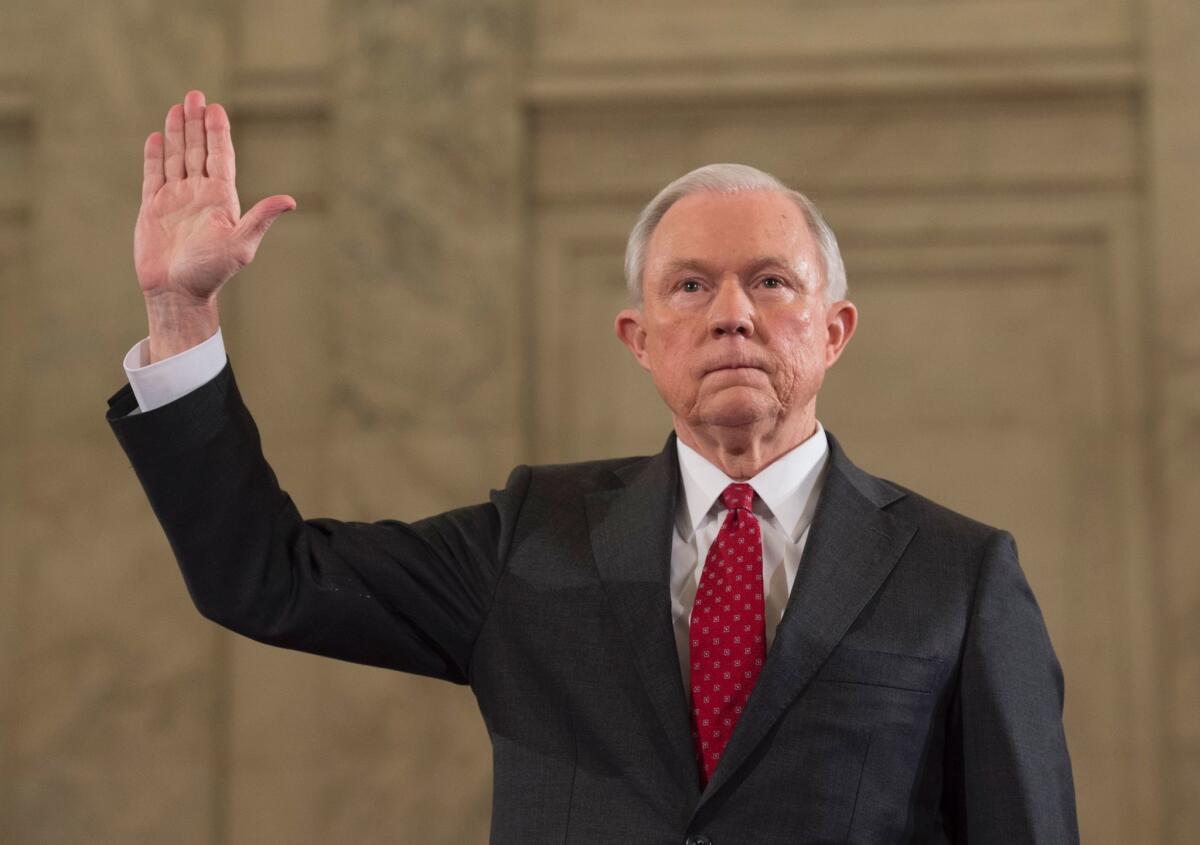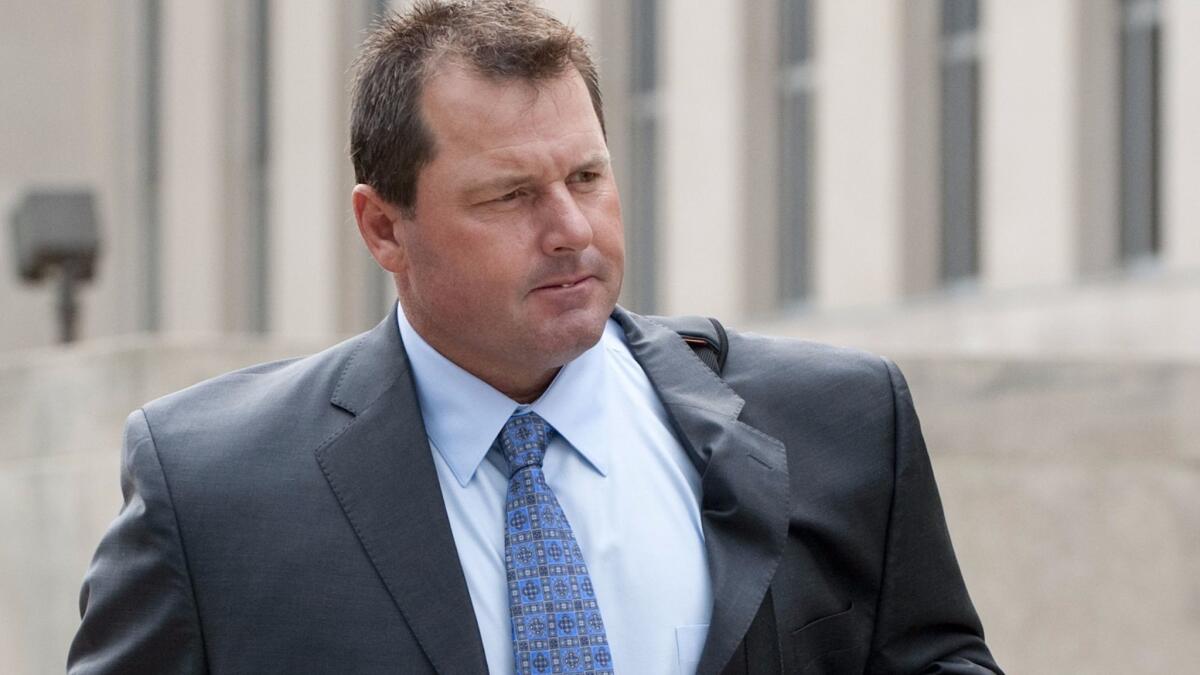Sessions’ testimony on Russia talks was false. Was it perjury?

- Share via
Contrary to what he told Congress at his confirmation hearing, Atty. Gen. Jeff Sessions did indeed “have communications with the Russians” when he was a top Trump campaign advisor on national security.
But did Sessions commit perjury?
Perjury accusations have bedeviled many other Cabinet secretaries and members of Congress in recent decades. It was a central accusation in President Clinton’s impeachment. Prosecutors have also put sports stars and business moguls on trial for perjury.
In Sessions’ case, even President Trump conceded that the former Alabama senator “could have stated his response more accurately.” Sessions, the Washington Post reported Wednesday, spoke twice with Russian Ambassador Sergey Kislyak during the presidential campaign.
Making a false statement, however, is not necessarily perjury.
What exactly is perjury?
It’s violating an oath to tell the truth by stating something that the person knows to be false. Under federal law, perjury is a felony if the false statement involves anything “material” in a legal matter. It carries a penalty of up to five years in prison — or eight years in terrorism cases.
Is anyone suggesting that Sessions’ testimony about the Russians qualifies as perjury?
Yes. Harvard University law professor Laurence H. Tribe and some other Trump critics were quick to conclude that Sessions committed perjury.
Sessions has denied making any dishonest statements to Congress. He said he intended to state that he did not discuss election matters with the Russians — not that he didn’t speak with them at all.
Democrats on Capitol Hill have clamored for Sessions’ resignation, but some of the party’s key lawmakers were still cautious about accusing him of breaking the law. Rep. Adam B. Schiff (D-Burbank) said Sessions “clearly misled the Senate.”
Live coverage from the campaign trail »
Didn’t Republicans call for perjury charges against Hillary Clinton?
Yes. House Republicans alleged in August that Clinton perjured herself in testimony to Congress on her use of a private email server when she was secretary of State.
They argued, among other things, that Clinton stated falsely that she neither sent nor received emails that were marked classified at the time they were transmitted through the private server.
FBI Director James B. Comey said it was unclear whether Clinton realized a few of the emails were classified, and he recommended against prosecution. Clinton was never charged with a crime.
Who would prosecute a sitting attorney general?
With his senior staff not yet in place at the Justice Department, the decision on whether to investigate or prosecute Sessions would be up to the acting deputy attorney general, Dana J. Boente, who is also U.S. attorney for the Eastern District of Virginia.
Trump put Boente in that job after firing Sally Yates, the Obama administration holdover who refused to defend Trump’s executive order to ban refugees and visitors from seven predominantly Muslim countries.
What about calls for a special prosecutor?
The federal law on special prosecutors expired in 1999. But Richard W. Painter, who was associate counsel to President George W. Bush from 2005 to 2007, said Trump could still name one — a step the president seems unlikely to take. To ensure a special prosecutor is widely perceived as independent, Painter suggested that Trump name a three-judge panel to make the choice.
This all rings familiar. Have other attorneys general faced perjury accusations?
Yes. John N. Mitchell, an attorney general under President Nixon, served 19 months in prison in the 1970s after he was convicted of perjury and obstruction of justice in the Watergate scandal.
Mitchell’s successor as attorney general, Richard Kleindienst, was charged with making false statements to the Senate at his confirmation hearing.
Kleindienst told the Senate Judiciary Committee that he’d never spoken with anyone at the White House about a Justice Department antitrust suit against a big Republican donor, International Telephone and Telegraph Corp. But an Oval Office tape later revealed that Nixon had told Kleindienst to drop the case.
He pleaded guilty to a lesser charge of failing to testify fully. His 30-day jail sentence was suspended.
Painter, now a law professor at the University of Minnesota, argues that Sessions’ statement about not communicating with the Russians was essentially the same conduct as Kleindienst’s.
Is it mostly people in politics who get prosecuted for perjury?
No. Former San Francisco Giants star Barry Bonds was charged with perjury for his testimony before a grand jury investigating illegal steroid distribution. The perjury case ended in a hung jury, and an appeals court overturned Bonds’ felony conviction on a related obstruction of justice charge.

Former New York Yankees pitcher Roger Clemens was acquitted of perjury in 2012 after a trial on charges that he lied to Congress about never using steroids or human growth hormone.
Basketball forward Chris Webber of the Sacramento Kings was charged with perjury for lying to a grand jury about accepting money from a booster while playing at the University of Michigan. He pleaded guilty to a lesser charge and did no jail time.
Kimberly Jones, the rapper who goes by Lil’ Kim, was sentenced to a year in prison and fined $50,000 for perjury. She was convicted of lying to a grand jury about a 2001 shootout among rival rappers in Manhattan.
And lifestyle maven Martha Stewart served five months in prison after she was convicted of perjury and other charges in 2004 for lying to federal law enforcement authorities about a stock sale.
Twitter: @finneganLAT
ALSO
Trump wants $54 billion more for defense. The military isn’t sure what that means.
How Jeff Sessions came to be an integral part of Trump’s administration
More to Read
Get the L.A. Times Politics newsletter
Deeply reported insights into legislation, politics and policy from Sacramento, Washington and beyond. In your inbox twice per week.
You may occasionally receive promotional content from the Los Angeles Times.











